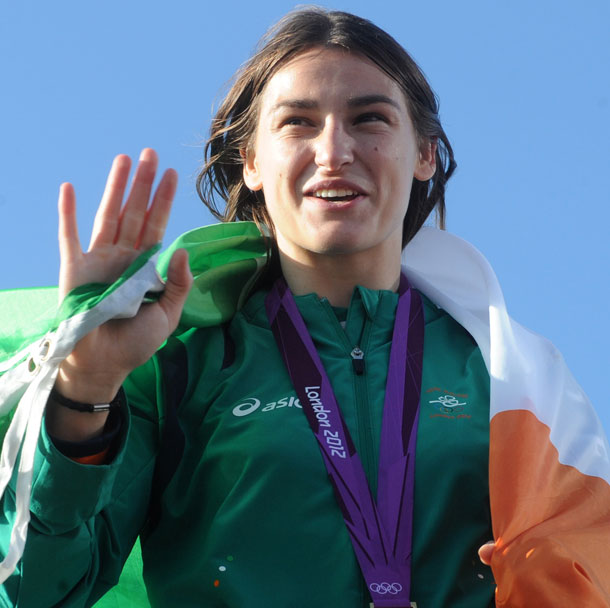4 November 2012 Edition
A level playing field
Between the Posts

Katie Taylor championed equality for women’s boxing
The hypocrisy is rank. After all, it was an Irishwoman who championed equality for women’s boxing in the Olympics. When Katie Taylor came home she was eulogised – three months on, it’s business as usual in the male-oriented sports media world. This is a well-oiled machine called structural inequality.
TWENTY-FOUR HOURS before the 2012 GAA All-Stars were announced, news bulletins bristled with breathless predictions. No one but the selection panel could know for sure but, with the supreme performance of Donegal, the county was expected to take the lion’s share of awards. With the announcement made in the week before Hallowe’en, news reports trumpeted the results.
It was a fitting climax to the end of a great year for Ulster Gaelic football, which reaped a great harvest in autumn 2012. For Donegal were not the only All-Ireland-winning Gaelic football team. Armagh won the All-Ireland intermediate title and Antrim were crowned All-Ireland junior champions in women’s Gaelic football. But, in a matter of weeks, events have revealed how the treatment of women’s sports serve to reinforce inequality.
Having a passion for hurling myself, I could hardly wait for the All-Ireland final replay between Galway and Kilkenny. As it turned out, none of us had to wait too long for the replay was rescheduled for the week after the All-Ireland Gaelic football final. The problem was that the All-Ireland women’s Gaelic football finals at junior, intermediate and senior level were already booked for Croke Park for the same weekend.
So what did the authorities in Cumann Luthchleas Gael do? The women’s big day was changed to be the hurlers’ replay. Six-County women’s football teams who won their right to play at ‘Headquarters’ were told to come back a week later.
So it’s easy to understand how it came to pass that “man walked on the moon before women played in Croke Park”, as reported in the book The GAA - A People’s History.
Women’s footballing success
Women’s Gaelic football has been the fastest-growing sport in Gaelic games for the last decade. Yet even in their home counties some of those women who were good enough to become All-Ireland champions this year receive scant support.
Take, for example, my home county of Antrim, where women’s Gaelic football is in its infancy. The women’s team has brought back more silverware than the men’s team, with two All-Ireland titles in four years. Yet these greater gains have been with more modest financial and administrative support. Thanks are due to Club Aontroma for providing some financial back-up. The success of the women’s footballers has also been publicly acknowledged by the county chairperson. But the fact remains that the All-Ireland Junior Champions of 2012 played as often in Croke Park as they did on their county ground at Casement.
This is not unique to Antrim. Coaches and players in women’s Gaelic football across the country encounter inequality in access to facilities. It is not only evident in the GAA but throughout society. In councils, under-provision of facilities for Gaelic games has been successfully exposed by Sinn Féin, the GAA’s Ulster Council and local clubs. However, for those involved in women’s sports, those inequalities are further compounded by council under-provision for females. This inequality of provision is pervasive and institutional.
Inequality in public facilities is further entrenched in public representations of sport. You could wallpaper the house with pre-match and post-match coverage of the men’s Gaelic final. The Irish Times had special previews the days before the men’s match. RTÉ televised programmes the night before the throw-in, live coverage of the game itself, and a special Sunday Game later that night from the winners’ hotel.
Nothing like this for the (postponed) women’s finals. The Irish Times special sports supplement that weekend had three stories on the front page: the Rabodirect Rugby League, boxer John Joe Nevin turning professional, and a preview of the World Cup soccer qualifier against Germany. Women’s football finals were in three small pieces on page 8, beside three bigger stories on men’s Gaelic football. Apparently size does matter – at least for men’s sport!
Celebrated as equals
The hypocrisy is rank. After all, it was an Irishwoman who championed equality for women’s boxing in the Olympics. When Katie Taylor came home she was eulogised – three months on, it’s business as usual in the male-oriented sports media world. This is a well-oiled machine called structural inequality.
If esteem and attention was based on consistency and performance, everyone would know that the best Gaelic football players in the country are the women of Cork. They have won a phenomenal six of the last seven All-Ireland senior titles. Many of their team are involved in other sports at national level but don’t expect them to become media darlings like ‘Gooch’ or ‘Star’.
The only antidote is positive, public action. That’s exactly what Minister for Sport Caral Ní Chuilin is planning. She will be hosting an event at Stormont for all our Ulster winning teams. Men and women will be celebrated as equals in sport. We can each play a part in creating a level playing field.




